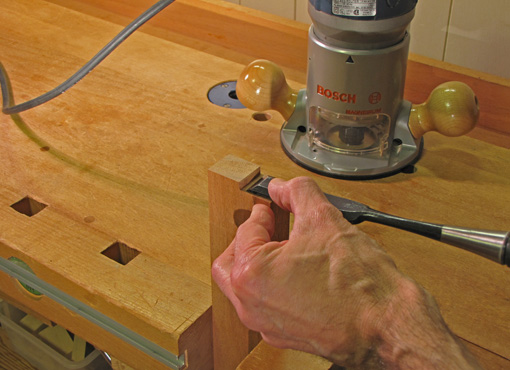
It is not easy to make fine things from wood. Woodworking is a succession of mostly subtractive steps which requires careful planning. The critical differences between success and failure in most woodworking processes are subtle, often difficult to reliably articulate, and regrettably seem to require a bit of failure prior to the success.
Human nature creates a tendency to imagine an easy path to success, and, further, to seek this illusory path against all odds. Now certainly, woodworking can be taught and learned with reasonable diligence and, along the way, plenty of fun. Today, there is an abundance of excellent learning tools which admirably remove the unnecessary mystery from woodworking. Unfortunately, the woodworking student – and that means all of us – can be easily distracted by the allure of magic.
Magic is everywhere in the world of woodworking. Catalogs tout machine jigs, especially for the router, that guarantee “perfect” results “every time”, hinting that no real skill is required. Sharpening and finishing, perhaps because they harbor perceived mysteries, are particularly prone to the din of hype. Gurus demonstrate astonishingly fast technique making parts that are conveniently abstracted from the constraints of a real project.
Sure, there are places for time-savers, innovative devices, and instructive demonstrations. The point here is that the hype can lure you to squander your efforts seeking answers in the wrong places while neglecting the acquisition of true craftsmanship. Though the noble task is slower than we might like, and sometimes disappointing, it is ultimately joyful.
Consider this: the only magic tools are the ones attached to the ends of your arms, and they only do what your brain tells them to do. I suggest being cautious about where you invest your time and energy in developing your woodworking craftsmanship. You very likely have an intuitive sense of true skill and quality, especially if you have developed it in other fields. Follow that, not the hype.
That’s the way to happy woodworking.


Good post. It’s well to keep in mind that the joy is in the journey.
As a guitarist, I see numbing amounts of magical allures and, as you say, it is easy to seek answers in the wrong places.
I like your point about bringing knowledge from other fields. Organization and procedural skills are a big part of making things in wood or any medium and those are universal skills in the work world.
Rob,
Excellent post! I couldn’t agree more especially as the owner of a few magic tricks. In the past 2 years I have tried really hard to strip away jigs and specialty tools and get back to the roots of woodworking. It is indeed truly joyful. Then you slowly integrate some magic tricks back into the repertoire and you truly appreciate them not just for the convenience but the knowledge that you can do without them if the project situation demands it.
Tico, is a fakebook magic? Cause they are saving my life trying to learn to play guitar.